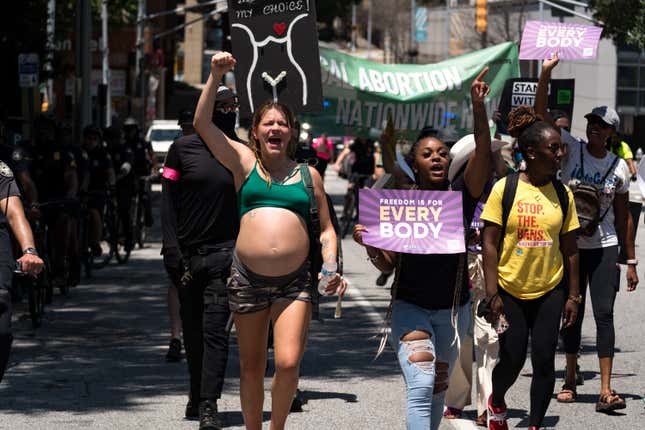
It’s hard to believe that it’s only been a month since the conservative justices on the Supreme Court overturned Roe v. Wade, opening the floodgates for states across the country to ban abortion.
As expected, anti-abortion lawmakers wasted no time enacting their agenda.
Eight states have already completely banned abortion – including Alabama, Arkansas, Mississippi, Missouri, Oklahoma, South Dakota, Texas, and Wisconsin, according to the New York Times’ tracker. And more states are likely to follow their lead when state legislatures return in six months.
In Texas, where Kamyon Conner serves as Executive Director of the Texas Equal Access Fund, a local abortion fund, she says the end of Roe has led to dangerous levels of confusion among doctors.
“People have been contacting me saying they have a friend with an ectopic pregnancy, and no one will support them in figuring out what to do,” says Conner. “They’re having a miscarriage, and their doctor said they can’t prescribe them anything for it because of the abortion laws.”
Both an ectopic pregnancy and complications related to miscarriage can have painful and even fatal consequences if left untreated. And despite conservative rhetoric to the contrary, neither can result in a viable pregnancy.
“There’s really no doubt that we have a public health emergency,” says Katherine Gillespie, Senior Federal Policy Counsel at the Center for Reproductive Rights.
Gillespie’s organization, which litigates abortion cases around the country, has joined forces with advocates and Democratic lawmakers to urge Biden to declare an emergency under the Public Readiness and Emergency Preparedness Act.
In theory, she explains, the declaration would allow health care providers to prescribe and distribute abortion pills in states where lawmakers have banned medication abortion without facing civil or criminal penalties.
While this wouldn’t legalize all abortion care, medication abortions now account for more than half of all abortions in the United States, according to the Guttmacher Institute, a reproductive health care research firm.
So increasing access to medication abortion would be a big step in the right direction, says Morgan Hopkins, Interim Executive Director of Campaigns and Strategy for All* above All, a reproductive justice advocacy organization.
“If we’re able to increase medication abortion access, you’re enabling not only bodily autonomy,” says Hopkins, “but also potentially avoiding many other complex health problems.”
This is especially true for Black pregnant people, who disproportionately suffer from adverse and even deadly birth out-comes when forced to carry a pregnancy to term, says Hopkins.
The consequences of inaction are “dire,” says Gillespie. And the excuse for Biden’s inaction given by senior White House aides, according to Politico, that the declaration could open the White House up to litigation, is insufficient, she says.
“If the administration is only willing to take actions that won’t be challenged, we have to ask what’s left,” says Gillespie? “It’s clear that opponents of choice will challenge anything and everything… so the threat of litigation can’t be the bar used to assess possible actions the administration can take.”
It’s worth noting that advocates at the national and local-level agree that using the Public Readiness and Emergency Preparedness Act to open-up medication abortion access won’t be sufficient to solve this crisis.
For one, medication abortions are most effective in the first ten weeks of pregnancy and won’t work to solve all pregnancy-related complications that require an abortion.
But, they all agree that doing something is better than the status-quo.
“I think [the declaration] would be great because people deserve to access medical care and have a voice in care without the fear of criminalization,” says Conner. “But also, medication abortion and being able to self-manage abortions is not going to be enough.”

